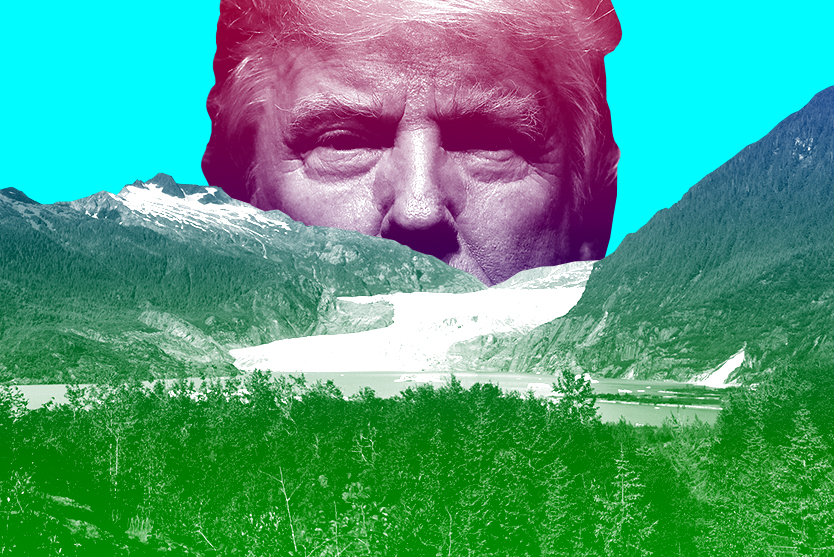Trump's Tongass troll


A free daily email with the biggest news stories of the day – and the best features from TheWeek.com
You are now subscribed
Your newsletter sign-up was successful
If President Trump's decision to strip protections in Alaska's Tongass National Forest was little more than a troll — well, he got us. For environmentalists and climate science believers, the announcement Wednesday was received with about the same disbelief, horror, and revulsion as watching someone kick a kitten; the "lungs of the country," "America's Amazon," the "crown jewel" of the National Forest Service, now available for more than nine million acres of timber harvest, much of it old growth.
While Trump has touted his environmental record in his re-election campaign — by signing the Great American Outdoors Act and mispronouncing "Yosemite," among other things — his four years in office have been distinguished by what seems to be a personal vendetta against former President Barack Obama, including unsuccessfully trying to overturn his predecessor's offshore drilling ban in the Arctic and reducing the size of Bears Ears National Monument. But the Tongass decision in particular stands out as tragic foolishness, not only because it is one of the most extraordinary and precious swaths of land in the nation, but because there's no other even plausibly defensible rationale for the move.
Home to ancient and threatened Alaska yellow cedars, the fascinating Alexander Archipelago wolves, all five species of salmon, some 10,000 bald eagles, and the eerily beautiful spirit bear, the Tongass is the largest temperate rainforest in the world, a carbon sink that stores "the equivalent of about 8 percent of the carbon stored in all the forests of the lower 48 states combined," The New York Times reports. The Trump administration has been attempting to open the forest up to logging for years now, to much outcry — including my own — while ostensibly helping local politicians who say the timber would help the state's economy.
The Week
Escape your echo chamber. Get the facts behind the news, plus analysis from multiple perspectives.

Sign up for The Week's Free Newsletters
From our morning news briefing to a weekly Good News Newsletter, get the best of The Week delivered directly to your inbox.
From our morning news briefing to a weekly Good News Newsletter, get the best of The Week delivered directly to your inbox.
But timber accounts for just 1 percent of the regional employment, The Washington Post reports. Keeping the Tongass wild and untapped might actually help the economy more, with fishing and tourism accounting for 26 percent of the jobs in the area. In fact, 96 percent of comments during the U.S. Forest Service's review of the plan opposed opening the forest up; likewise, all five Alaska Native tribal nations withdrew from cooperating earlier this month, citing a refusal to "endow legitimacy upon a process that has disregarded our input at every turn." And as Ken Rait, the project director of the nonprofit Pew Charitable Trusts, told The Guardian, "between taxpayer expenses and the fact that the majority of logs cut on the Tongass will be exported to China and other Pacific Rim nations, [Wednesday's] decision isn't going to have robust economic benefits to anyone in this country."
Short of any material justification, the Tongass decision is, in effect, destroying the planet to own the libs. Good luck with that.
A free daily email with the biggest news stories of the day – and the best features from TheWeek.com
Jeva Lange was the executive editor at TheWeek.com. She formerly served as The Week's deputy editor and culture critic. She is also a contributor to Screen Slate, and her writing has appeared in The New York Daily News, The Awl, Vice, and Gothamist, among other publications. Jeva lives in New York City. Follow her on Twitter.
-
 How the FCC’s ‘equal time’ rule works
How the FCC’s ‘equal time’ rule worksIn the Spotlight The law is at the heart of the Colbert-CBS conflict
-
 What is the endgame in the DHS shutdown?
What is the endgame in the DHS shutdown?Today’s Big Question Democrats want to rein in ICE’s immigration crackdown
-
 ‘Poor time management isn’t just an inconvenience’
‘Poor time management isn’t just an inconvenience’Instant Opinion Opinion, comment and editorials of the day
-
 Epstein files topple law CEO, roil UK government
Epstein files topple law CEO, roil UK governmentSpeed Read Peter Mandelson, Britain’s former ambassador to the US, is caught up in the scandal
-
 Iran and US prepare to meet after skirmishes
Iran and US prepare to meet after skirmishesSpeed Read The incident comes amid heightened tensions in the Middle East
-
 Israel retrieves final hostage’s body from Gaza
Israel retrieves final hostage’s body from GazaSpeed Read The 24-year-old police officer was killed during the initial Hamas attack
-
 China’s Xi targets top general in growing purge
China’s Xi targets top general in growing purgeSpeed Read Zhang Youxia is being investigated over ‘grave violations’ of the law
-
 Panama and Canada are negotiating over a crucial copper mine
Panama and Canada are negotiating over a crucial copper mineIn the Spotlight Panama is set to make a final decision on the mine this summer
-
 Why Greenland’s natural resources are nearly impossible to mine
Why Greenland’s natural resources are nearly impossible to mineThe Explainer The country’s natural landscape makes the task extremely difficult
-
 Iran cuts internet as protests escalate
Iran cuts internet as protests escalateSpeed Reada Government buildings across the country have been set on fire
-
 US nabs ‘shadow’ tanker claimed by Russia
US nabs ‘shadow’ tanker claimed by RussiaSpeed Read The ship was one of two vessels seized by the US military
